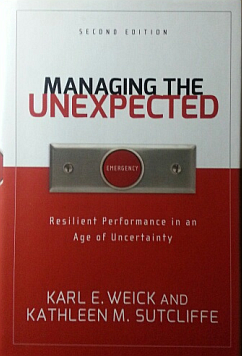 The New Year of 2018 has brought some unexpected challenges. Or were they?
The New Year of 2018 has brought some unexpected challenges. Or were they?
We have belligerent bullies with their fingers on their nuclear buttons.
We have an NHS in crisis, with corridor-queues of urgent frail, elderly, unwell and a month of cancelled elective operations.
And we have winter storms, fallen trees, fractured power-lines, and threatened floods – all being handled rather well by people who are trained to manage the unexpected.
Which is the title of this rather interesting book that talks a lot about HROs.
So what are HROs?
“H” stands for High. “O” stands for Organisation.
What does R stand for? Rhetoric? Rigidity? Resistance?
Watching the news might lead one to suggest these words would fit … but they are not the answer.
“R” stands for Reliability and “R” stands for Resilience … and they are linked.
Think of a global system that is so reliable that we all depend on it, everyday. The Global Positioning System or the Internet perhaps. We rely on them because they serve a need and because they work. Reliably and resiliently.
And that was no accident.
Both the Internet and the GPS were designed and built to meet the needs of billions and to be reliable and resilient. They were both created by an army of unsung heroes called systems engineers – who were just doing their job. The job they were trained to do.
The NHS serves a need – and often an urgent one, so it must also be reliable. But it is not.
The NHS needs to be resilient. It must cope with the ebb and flow of seasonal illness. But it does not.
And that is because the NHS has not been designed to be either reliable or resilient. And that is because the NHS has not been designed. And that is because the NHS does not appear to have enough health care systems engineers trained to do that job.
But systems engineering is a mature discipline, and it works just as well inside health care as it does outside.
And to support that statement, here is evidence of what happened after a team of NHS clinicians and managers were trained in the basics of HCSE.
So the gap seems to be just an awareness/ability gap … which is a bridgeable one.
Who would like to train to be a Health Case Systems Engineer and to join the growing community of HCSE practitioners who have the potential to be the future unsung heroes of the NHS?
Click here if you are interested: http://www.ihcse.uk
PS. “Managing the Unexpected” is an excellent introduction to SE.
